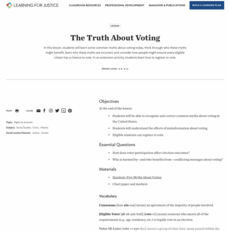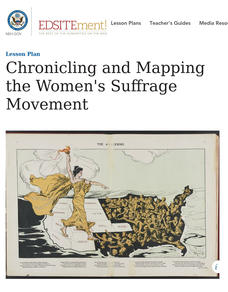Learning for Justice
Change Agents in Our Own Lives
Everyone has the power to change their own lives. Young historians learn how they can become agents for change in their own lives and the community. The lesson focuses on positive role models and what motivates individuals to promote...
Teaching Tolerance
Modern-Day Heroes: People Who Are Making a Difference
Not all superheroes wear capes. An engaging lesson delves into the world of modern-day heroes and activists for change. Academics learn there are many different ways to be a hero as well as explore what makes a person a hero. The...
Teaching Tolerance
Where We Stand
Everyone is entitled to their own opinion. Academics learn strategies to share their opinions and agree or disagree with others in a respectful manner. The resource provides scenarios to help individuals form opinions and share them with...
Teaching Tolerance
The True History of Voting Rights
Explore what voting rights really are in an intriguing lesson plan that explores the history of American voting. The resource examines the timeline of voting rights in the United States with group discussions, hands-on-activities, and...
Teaching Tolerance
The Truth About Voting
True or False: Only Presidential elections matter. Academics delve into common voting myths to understand what is true and why the election process is critical to democracy. The lesson uses group discussion, activities, and handouts to...
National Endowment for the Humanities
The Matter of the Philippines
The United States won the Spanish-American War, so now what? Young scholars act as advisors to President McKinley and use primary sources to recommend what America should do with its territories. Using a variety of perspectives—including...
National Endowment for the Humanities
Treaty Negotiations
Let's make a deal! Drawing on work in previous unit lessons, young scholars negotiate favorable trade treaties with other nations during the early Modern Empire Era. Their work relies on previously completed activities, as well as...
National Endowment for the Humanities
Planning for Treaty Negotiations
The party is over. Now it's time to get to work! Learners acting as agents for a country during the modern Age of Empires develop proposals to negotiate trade deals between the rising global powers. Using research from previous lessons,...
National Endowment for the Humanities
Hosting a Diplomatic Reception
The toasts are written, the table is set: it's time to party! Young scholars use a role-playing activity to go toast to toast. After researching and writing toasts for their allied countries during the modern Age of Empires, individuals...
National Endowment for the Humanities
Writing a Diplomatic Toast
Here's to you! Using a role-playing activity and primary source analysis, learners discover the importance of diplomacy. Impersonating a diplomat from a great empire, they write a toast to another empire, analyzing the strengths and...
National Endowment for the Humanities
Analyzing “Intercepted Intelligence”
A good diplomat needs to know how world events can affect their country. First, class members examine the Papal Bull that excommunicated Queen Elizabeth I from the Roman Catholic Church. Then, learners playing the role of diplomat from...
National Endowment for the Humanities
Empire Intelligence Briefings
To trade or not to trade. Young diplomats put their country's best foot forward in a series of briefings for other countries about their nations. The goal is to persuade others to engage in diplomacy and trade. Using a previous lesson...
National Endowment for the Humanities
Learning about Early Modern Era Empires
You are a diplomat during the Age of Empire: prepare a briefing about your country. Young scholars take on the challenge using a role-play exercise to examine various empires during the rise of global interconnectedness. Materials...
National Endowment for the Humanities
The Tyranny of the Majority
In American democracy, majority rules but what prevents the voices of the few from being crushed? Using excerpts from Alexis de Tocqueville's writings, young historians explore cases where minority rights were trampled upon. Extension...
National Endowment for the Humanities
Chronicling and Mapping the Women's Suffrage Movement
While women's suffrage is often believed to be the result of a single constitutional amendment, the effort of women to secure the vote spanned decades and continents. Using primary sources in online archives, class members explore the...
Teaching Tolerance
Social Media for Social Action
Engage in activism, not slacktivism! Scholars discuss social media and the Internet as tools for social change. Next, they engage in a close reading strategy called Thinking Notes as they read an article about social media activism.
Teaching Tolerance
Digital Activism Remixed: Hashtags for Voice, Visibility and Visions of Social Justice
It's time to discover hashtag activism! Using an engaging resource, learners explore viral hashtag campaigns relating to diversity, identity, and justice. Next, they either design their own hashtag campaigns or respond to existing ones.
Teaching Tolerance
Thanksgiving Mourning
Two primary sources, a speech, and an article provide tweens and teens with different perspectives of the American Thanksgiving holiday. After analyzing Wamsutta James' suppressed speech and Jacqueline Keeler's article, class members use...
Teaching Tolerance
Why Local Elections Matter
Uncle Sam wants everyone to vote in local elections! Geared toward middle and high school scholars, the resource explores voter turnout and the importance of local elections. Academics participate in group discussion, complete...
National Endowment for the Humanities
Doing Oral History with Vietnam War Veterans
Get the story from those who experienced it. Engage learners with a structured oral history project involving Vietnam War era veterans. By conducting thoughtful interviews, class members learn what it was like to serve in the...
National Endowment for the Humanities
“From Time to Time”: Presidents and Communicating with the Public
While the Constitution requires a "State of the Union" address, it doesn't give many details. In fact, it wasn't until Woodrow Wilson that the periodic update to Congress was given in-person. Using primary sources, recordings and...
Benjamin Franklin Tercentenary
Let’s Throw an Electric Science Party!
Are you looking for a shockingly good lesson plan? Check out one that has middle schoolers recreate four of Benjamin Franklin's experiments. Groups investigate, observe, and draw conclusions about static electricity and electrical...
PBS
PBS Electoral Decoder
Imagine being able to explore all the presidential elections from 1789-2016! Being able to examine the key events, how the states voted, and the importance of the Electoral College in each of the elections! A PBS cartogram makes all this...
Learning to Give
Deliver Gratitude Day
Gratitude is the focus of a discussion that sets the stage for pupils to take part in a service-learning project in which they deliver notes of kindness by way of social media or mail. A reflection closes the learning experience.

























